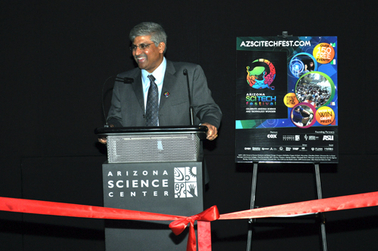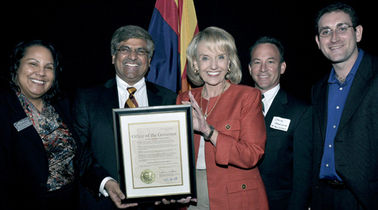Sethuraman Panchanathan
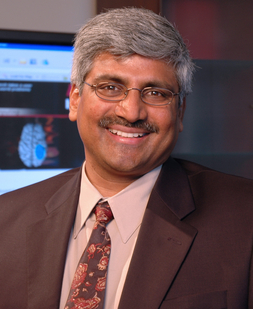 Professor Sethuraman (Panch) Panchanathan is currently the Senior Vice President of Knowledge Enterprise Development. In this role he is responsible for advancing research, innovation, entrepreneurship and economic development at ASU. He is a Foundation Chair in Computing and Informatics and the Director of the Center for Cognitive Ubiquitous Computing (CUbiC). Dr. Panchanathan was the Founding Director of the School of Computing and Informatics and was instrumental in founding the Biomedical Informatics Department at ASU. He was also the Chair of the Computer Science and Engineering Department. On June 13, 2014 he was nominated by US President Barack Obama as a member of the National Science Board of National Science Foundation.
Professor Sethuraman (Panch) Panchanathan is currently the Senior Vice President of Knowledge Enterprise Development. In this role he is responsible for advancing research, innovation, entrepreneurship and economic development at ASU. He is a Foundation Chair in Computing and Informatics and the Director of the Center for Cognitive Ubiquitous Computing (CUbiC). Dr. Panchanathan was the Founding Director of the School of Computing and Informatics and was instrumental in founding the Biomedical Informatics Department at ASU. He was also the Chair of the Computer Science and Engineering Department. On June 13, 2014 he was nominated by US President Barack Obama as a member of the National Science Board of National Science Foundation.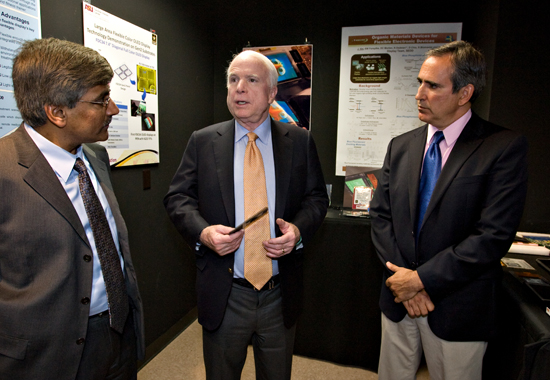 “Every facet of research at ASU is important to the overall goal of tackling complex societal challenges,” he said. “It is therefore important to understand and appreciate the different expertise areas at the university and to help advance the research aspirations of each faculty member and researcher.
“Every facet of research at ASU is important to the overall goal of tackling complex societal challenges,” he said. “It is therefore important to understand and appreciate the different expertise areas at the university and to help advance the research aspirations of each faculty member and researcher.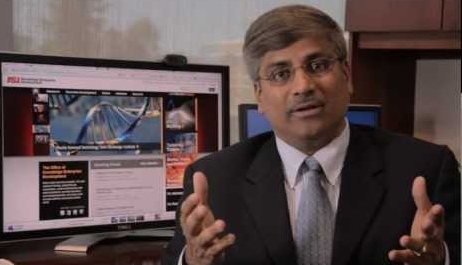 He moved to Arizona in 1997 as a tenured associate professor in the Department of Computer Science and Engineering at ASU In 2001, he was promoted to full professor and founded the Center for Cognitive Ubiquitous Computing (CUbiC), which is focused on designing technologies and devices for assisting individuals with disabilities. He also founded and led the School of Computing and Informatics (2006-2009) and the Department of Biomedical Informatics (2005-2007). Panchanathan was appointed as the university Chief Research Officer in 2009, where he was responsible for conceptualizing and building large interdisciplinary initiatives at ASU. In 2011, he was promoted to Senior Vice President of ASU’s Office of Knowledge Enterprise Development, for the advancement of research, entrepreneurship, innovation and economic development activities.
He moved to Arizona in 1997 as a tenured associate professor in the Department of Computer Science and Engineering at ASU In 2001, he was promoted to full professor and founded the Center for Cognitive Ubiquitous Computing (CUbiC), which is focused on designing technologies and devices for assisting individuals with disabilities. He also founded and led the School of Computing and Informatics (2006-2009) and the Department of Biomedical Informatics (2005-2007). Panchanathan was appointed as the university Chief Research Officer in 2009, where he was responsible for conceptualizing and building large interdisciplinary initiatives at ASU. In 2011, he was promoted to Senior Vice President of ASU’s Office of Knowledge Enterprise Development, for the advancement of research, entrepreneurship, innovation and economic development activities.Governor’s Innovator of the Year for Academia Award, Governor’s Celebration of Innovation Awards, Information Technology Centric Assistive and Rehabilitative Environments (iCARE) for Individuals who are blind and Visually Impaired, Center for Cognitive Ubiquitous Computing, 2004.
ASU Leadership Award, “Outstanding service and contributions to the ASU Department of Computer Science and Engineering and the School of Computing and Informatics”, 2009.
Academic Collaboration Award, Outstanding Contributions to Improving the lives of Individuals with Disabilities through the iCARE Research Project, ASU Disability Resources for Students, 2004.
Best paper award, “Configurable Haptic Training System for Laparoscopy”, at Medicine Meets Virtual Reality 16 Conference, CA, 2008.
Canadian Advanced Technology Association (CATA) Best Graduate Thesis Award, Masters Thesis student Mr. Eric Chan, Toronto, 1994.
Microsoft Imagine Cup 2010for CUbiC iCARE Note-Taker Project, World Finals in Touch and Tablet category, Warsaw, Poland, 2010.
